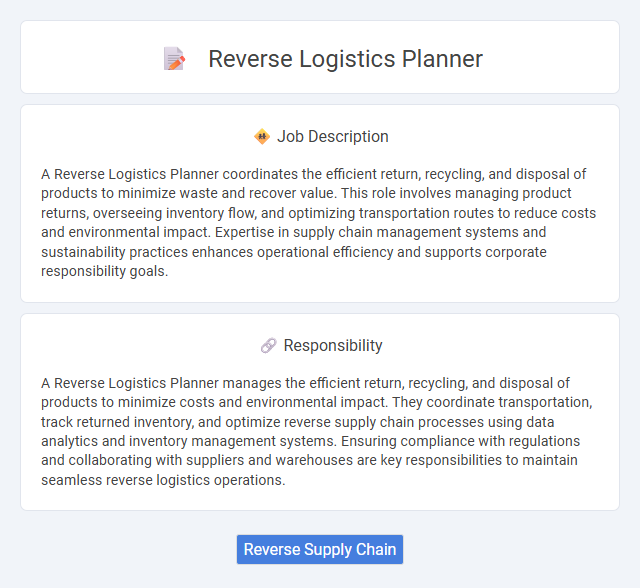
A Reverse Logistics Planner coordinates the efficient return, recycling, and disposal of products to minimize waste and recover value. This role involves managing product returns, overseeing inventory flow, and optimizing transportation routes to reduce costs and environmental impact. Expertise in supply chain management systems and sustainability practices enhances operational efficiency and supports corporate responsibility goals.
Individuals who thrive in organized, detail-oriented environments are likely to excel as reverse logistics planners. People with strong problem-solving skills and the ability to manage complex workflows may be well-suited for this role. Those who prefer routine tasks without dynamic challenges might find the job less compatible with their strengths.
Qualification
A Reverse Logistics Planner requires expertise in supply chain management, inventory control, and transportation coordination to efficiently manage product returns and recycling processes. Proficiency in ERP systems such as SAP or Oracle and strong analytical skills are essential for optimizing reverse flow and reducing costs. Experience in data analysis, problem-solving, and regulatory compliance ensures effective handling of reverse logistics operations and enhances sustainability goals.
Responsibility
A Reverse Logistics Planner manages the efficient return, recycling, and disposal of products to minimize costs and environmental impact. They coordinate transportation, track returned inventory, and optimize reverse supply chain processes using data analytics and inventory management systems. Ensuring compliance with regulations and collaborating with suppliers and warehouses are key responsibilities to maintain seamless reverse logistics operations.
Benefit
A reverse logistics planner likely enhances operational efficiency by optimizing product returns and minimizing waste. This role may improve cost savings through better inventory management and reduced transportation expenses. Companies could see increased customer satisfaction by streamlining the returns process and ensuring timely resolution.
Challenge
A reverse logistics planner likely faces the challenge of managing complex return processes while minimizing costs and delays. Coordinating with multiple stakeholders such as suppliers, warehouses, and transportation providers probably requires advanced problem-solving skills to optimize product flow and inventory management. Predicting demand for returns and handling unpredictable variability in volume could further complicate efficient planning and execution.
Career Advancement
A Reverse Logistics Planner coordinates the efficient return and redistribution of products, optimizing supply chain performance and reducing waste. Mastery of inventory management software and data analysis enhances decision-making capabilities, paving the way for leadership roles such as Logistics Manager or Supply Chain Analyst. Career advancement opportunities often include specialization in sustainability initiatives or integration with broader supply chain strategy teams.
Key Terms
Reverse Supply Chain
A Reverse Logistics Planner manages the flow of returned products, materials, and packaging from customers back to the manufacturer or distribution center, optimizing routes and reducing costs in the reverse supply chain. Key responsibilities include coordinating product returns, overseeing refurbishment or disposal processes, and ensuring compliance with environmental regulations. Expertise in inventory management systems and data analysis is essential to improve reverse logistics efficiency and enhance sustainability efforts.
 kuljobs.com
kuljobs.com